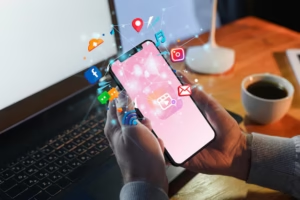What Is Digital Marketing?
Social media has revolutionized the way people communicate, and digital marketing share information, and connect with one another. At its core, social media refers to online platforms and applications that enable users to create, share, and interact with content in real time. From text-based posts and photos to videos and live streams, social media has transformed into a dynamic ecosystem where ideas, trends, and cultures converge.
The Evolution of Social Media
The journey of social media began in the early 2000s with platforms like Friendster and MySpace, which allowed users to create profiles, share interests, and connect with friends. These early platforms set the foundation for today’s giants like Facebook, Instagram, Twitter (now X), TikTok, and LinkedIn.
Over time, social media has evolved from a basic communication tool to a multifaceted medium that influences nearly every aspect of modern life, including business, entertainment, education, and politics. Today, billions of people use social media and digital marketing daily, making it an integral part of society.
Characteristics of Social Media and Digital Marketing.
To understand social media better, let’s explore its defining characteristics:
- User-Generated Content:; Social media platforms rely on user-generated content, including posts, images, videos, and comments. This democratization of content creation has empowered individuals to share their voices and stories.
-
Interactive and Real-Time Communication: , Social media facilitates two-way communication, unlike traditional media. Users can engage with posts, leave comments, and have real-time discussions.
- Networking: Social media connects people across the globe, fostering communities based on shared interests, professions, or causes.
- Virality: The speed at which information spreads on social media is unprecedented. A single post or video can go viral within hours, reaching millions of people.
- Data-Driven Personalization: Platforms use algorithms to deliver personalized content based on user preferences, behaviors, and interactions.
Popular Social Media Platforms
Each social media platform serves unique purposes and attracts different types of users. Below are some of the most popular platforms and their characteristics:
1. Facebook
- Focus: Networking, community building, and multimedia sharing.
- Audience: Broad, spanning all age groups.
- Features: Groups, pages, marketplace, and live streaming.
2. Instagram
- Focus: Photo and video sharing.
- Audience: Predominantly younger users, with a strong focus on visual storytelling.
- Features: Stories, reels, IGTV, and direct messaging.
3. Twitter (X)
- Focus: Microblogging and real-time updates.
- Audience: News enthusiasts, professionals, and influencers.
- Features: Hashtags, threads, and trending topics.
4. TikTok
- Focus: Short-form video content.
- Audience: Primarily Gen Z and millennials.
- Features: Creative tools, challenges, and viral trends.
5. LinkedIn
- Focus: Professional networking and career development.
- Audience: Job seekers, recruiters, and businesses.
- Features: Job postings, articles, and connections.
6. YouTube
- Focus: Video sharing and streaming.
- Audience: Diverse, spanning all demographics.
- Features: Channels, live streaming, and monetization options.
The Role of Social Media in Modern Life
1. Communication and Connection:
Social media makes it easy to stay connected with family, friends, and colleagues, regardless of geographical barriers.
2. Information and Awareness:
It has become a primary source of news and information. People use social media to stay updated on global events, trends, and topics.
3. Entertainment:
From viral memes and music videos to live streams and gaming, social media is a hub for entertainment.
4. Business and Marketing:
Businesses leverage social media for brand promotion, customer engagement, and targeted advertising. Influencers and brands often collaborate to reach specific audiences.
5. Social and Political Impact:
Social media plays a pivotal role in raising awareness about social issues, organizing movements, and influencing political opinions.
Benefits of Social Media
- Global Connectivity:
Social media breaks down barriers, enabling people from diverse backgrounds to connect and interact. - Access to Information:
Platforms provide instant access to news, educational content, and expert insights. - Opportunities for Expression:
Social media gives individuals a platform to share their stories, creativity, and opinions. - Business Growth:
Entrepreneurs and small businesses can reach larger audiences, drive sales, and establish brand identity through social media.
Challenges and Concerns
Despite its advantages, social media is not without challenges:
- Privacy and Security:
The collection of user data and the potential for breaches raise significant concerns. - Mental Health Impact:
Excessive use of social media can lead to anxiety, depression, and feelings of inadequacy due to comparison. - Misinformation:
The rapid spread of fake news and misinformation poses risks to public trust and societal stability. - Addiction:
The addictive nature of scrolling and notifications can lead to decreased productivity and strained relationships. - Cyberbullying:
Social media platforms can become arenas for harassment and bullying.
The Future of Social Media Marketing
The future of social media is shaped by emerging technologies and changing user behaviors. Key trends include Digital marketing:
- Artificial Intelligence (AI): AI will enhance personalization, content moderation, and user experiences.
- Augmented Reality (AR) and Virtual Reality (VR): Platforms are integrating AR and VR to create immersive experiences.
- Decentralization: Blockchain-based social networks aim to give users greater control over their data and content.
- Focus on Privacy: As users become more aware of privacy concerns, platforms are expected to adopt stricter data protection measures.
Conclusion
Social media is a powerful tool that has transformed how we communicate, share, and consume information. Its impact spans personal, professional, and societal spheres, making it an indispensable part of modern life.
While the benefits of social media are immense, it’s essential to navigate its challenges responsibly. By leveraging its potential wisely and fostering a culture of digital well-being, we can continue to harness the power of social media for a better, more connected world.
Social media has changed how people communicate and connect. Social media is, at its core, online platforms and apps. They let users create, share, and interact with content in real-time. Social media has changed. It now hosts text posts, photos, videos, and live streams. It’s a dynamic space where ideas, trends, and cultures converge.
People also read about Digital Marketing
